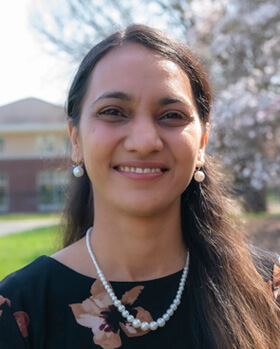October 4, 2021:
 This month, the Big Ten Cancer Research Consortium features our member institution The Cancer Center at Illinois at University of Illinois Urbana-Champaign and Neha Gothe, MA, PhD, associate professor of kinesiology and community health at the University of Illinois Urbana-Champaign, who serves as director of the university’s Exercise Psychology Lab.
This month, the Big Ten Cancer Research Consortium features our member institution The Cancer Center at Illinois at University of Illinois Urbana-Champaign and Neha Gothe, MA, PhD, associate professor of kinesiology and community health at the University of Illinois Urbana-Champaign, who serves as director of the university’s Exercise Psychology Lab.
She is taking her expertise in kinesiology and behavioral psychology to explore the benefits of non-traditional forms of movement, such as yoga, in cancer survivors.
Research Interests and Expertise:
Dr. Gothe’s research is focused on promoting physical activity through exercise such as yoga, to improve health and quality of life. Her expertise is in examining the efficacy of yoga interventions in improving neurocognitive health, physical fitness, and quality of life across the lifespan.
Dr. Gothe’s lab research is funded by the National Institutes of Health, where her team is currently conducting the first RCT, examining the effects of a 6-month yoga intervention on neurocognitive health among aging adults.
Her current study, “SAY Exercise,” a 5-year randomized trial funded by the National Institute on Aging, is enrolling participants to perform six months of yoga, aerobic exercise, or strength training, that consists of MRI brain scans before and after the study activity period. The study team will observe and analyze changes in brain structure and cognitive function. She and her study team would like to see how exercise may lessen symptoms of cancer-related cognitive impairment (CRCI), also known as chemo fog.
Educational Background:
- PhD & MS: University of Illinois Urbana-Champaign, Kinesiology
- MA: University of Mumbai, India, Applied Psychology
Three facts about Dr. Gothe:
- She played professional tennis.
- She loves hiking and camping at national parks.
- She enjoys cooking ethnic Indian meals.
About the Big Ten Cancer Research Consortium: The Big Ten Cancer Research Consortium was created in 2013 to transform the conduct of cancer research through collaborative, hypothesis-driven, highly translational oncology trials that leverage the scientific and clinical expertise of Big Ten universities. The goal of the Big Ten Cancer Research Consortium is to create a unique team-research culture to drive science rapidly from ideas to new approaches to cancer treatment. Within this innovative environment, today’s research leaders collaborate with and mentor the research leaders of tomorrow with the unified goal of improving the lives of all patients with cancer.
About the Big Ten Conference: The Big Ten Conference is an association of world-class universities whose member institutions share a common mission of research, graduate, professional and undergraduate teaching and public service. Founded in 1896, the Big Ten has sustained a comprehensive set of shared practices and policies that enforce the priority of academics in the lives of students competing in intercollegiate athletics and emphasize the values of integrity, fairness and competitiveness. The broad-based programs of the 14 Big Ten institutions will provide over $200 million in direct financial support to more than 9,800 students for more than 11,000 participation opportunities on 350 teams in 42 different sports. The Big Ten sponsors 28 official conference sports, 14 for men and 14 for women, including the addition of men’s ice hockey and men’s and women’s lacrosse since 2013. For more information, visit www.bigten.org.














Subscribe to the Big Ten CRC Newsletter X
X Facebook
Facebook YouTube
YouTube